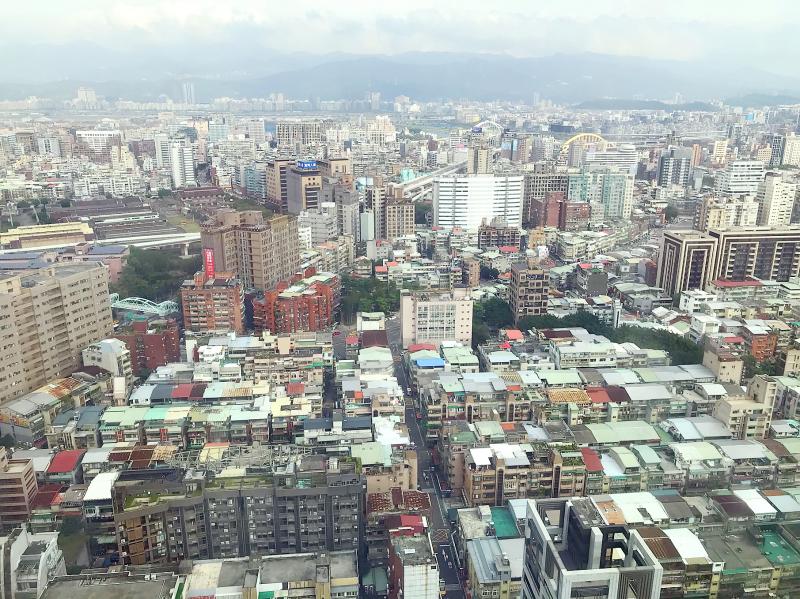Presale and new housing projects last quarter surged 38.1 percent from three months earlier nationwide, as the market emerged from a local COVID-19 outbreak, aided by excess liquidity and low interest rates, a survey by Cathay Real Estate Development Co (國泰建設) showed on Wednesday.
Developers and builders launched NT$339.2 billion (US$12.19 billion) of presale and newly completed houses on the market in the July-to-September quarter, the survey found.
The recovery in confidence was particularly evident in Kaohsiung, where presale projects and new houses grew 90.6 percent, followed by 83.5 percent in Taichung, 69.5 percent in New Taipei City and 57.2 percent in Taipei, it said.

Photo: Hsu Yi-ping, Taipei Times
However, presale and new housing projects declined 18.8 percent in Taoyuan, fell 46.4 percent in Hsinchu and plunged 37.6 percent in Tainan mainly due to high comparison bases, it said.
The sustained uptrend in house and land loans prompted the central bank last month to ban grace periods for second-home mortgages in the six special municipalities, as well as Hsinchu city and county, but unfavorable lending terms have failed to rein in real-estate lending so far, government data showed.
Potential closing home prices averaged NT$319,600 per ping (3.3m2) across the nation, climbing 4.05 percent from three months earlier, the survey showed.
The figures in Taipei rose 3.16 percent to NT$938,000 per ping, and edged up 1.1 percent in New Taipei City to NT$409,400 per ping.
Kaohsiung posted the biggest advance of 6.97 percent to NT$260,000 per ping, followed by Taichung with a 5.87 percent increase, but Taoyuan bucked the trend, declining 0.72 percent to NT$270,200 per ping, the survey showed.
Price concession rates shrank 3.28 percentage points to 10.17 percent in the third quarter, while the 30-day sales rate gained 5.05 percentage points to 16.5 percent, it said.
The market could receive continued support from ample liquidity and low borrowing costs, but the central bank could weigh in to prevent overheating, it said.

UNCERTAINTY: Innolux activated a stringent supply chain management mechanism, as it did during the COVID-19 pandemic, to ensure optimal inventory levels for customers Flat-panel display makers AUO Corp (友達) and Innolux Corp (群創) yesterday said that about 12 to 20 percent of their display business is at risk of potential US tariffs and that they would relocate production or shipment destinations to mitigate the levies’ effects. US tariffs would have a direct impact of US$200 million on AUO’s revenue, company chairman Paul Peng (彭雙浪) told reporters on the sidelines of the Touch Taiwan trade show in Taipei yesterday. That would make up about 12 percent of the company’s overall revenue. To cope with the tariff uncertainty, AUO plans to allocate its production to manufacturing facilities in

TAKING STOCK: A Taiwanese cookware firm in Vietnam urged customers to assess inventory or place orders early so shipments can reach the US while tariffs are paused Taiwanese businesses in Vietnam are exploring alternatives after the White House imposed a 46 percent import duty on Vietnamese goods, following US President Donald Trump’s announcement of “reciprocal” tariffs on the US’ trading partners. Lo Shih-liang (羅世良), chairman of Brico Industry Co (裕茂工業), a Taiwanese company that manufactures cast iron cookware and stove components in Vietnam, said that more than 40 percent of his business was tied to the US market, describing the constant US policy shifts as an emotional roller coaster. “I work during the day and stay up all night watching the news. I’ve been following US news until 3am

COLLABORATION: Given Taiwan’s key position in global supply chains, the US firm is discussing strategies with local partners and clients to deal with global uncertainties Advanced Micro Devices Inc (AMD) yesterday said it is meeting with local ecosystem partners, including Taiwan Semiconductor Manufacturing Co (TSMC, 台積電), to discuss strategies, including long-term manufacturing, to navigate uncertainties such as US tariffs, as Taiwan occupies an important position in global supply chains. AMD chief executive officer Lisa Su (蘇姿丰) told reporters that Taiwan is an important part of the chip designer’s ecosystem and she is discussing with partners and customers in Taiwan to forge strong collaborations on different areas during this critical period. AMD has just become the first artificial-intelligence (AI) server chip customer of TSMC to utilize its advanced

Six years ago, LVMH’s billionaire CEO Bernard Arnault and US President Donald Trump cut the blue ribbon on a factory in rural Texas that would make designer handbags for Louis Vuitton, one of the world’s best-known luxury brands. However, since the high-profile opening, the factory has faced a host of problems limiting production, 11 former Louis Vuitton employees said. The site has consistently ranked among the worst-performing for Louis Vuitton globally, “significantly” underperforming other facilities, said three former Louis Vuitton workers and a senior industry source, who cited internal rankings shared with staff. The plant’s problems — which have not